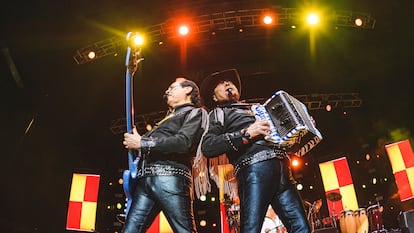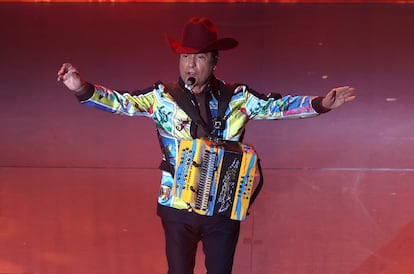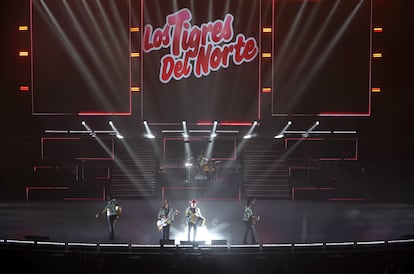Los Tigres del Norte: ‘We’re going to have to change the word ‘corrido’ to avoid getting in trouble’
The band’s leader, Jorge Hernández, addresses his musical genre’s controversial association with crime. He also shares his perspective on Mexican immigrants in the United States

Chihuahua, May 17, 2014. The northern Mexican city is experiencing a spike in violence. Thirty minutes before Los Tigres del Norte are due to begin their performance at the local arena, a man enters the dressing room to ask them not to sing songs with violent lyrics. The band’s leader, Jorge Hernández, pulls out the set list.
“Which ones are you prohibiting us from playing?”
“No, we’re not prohibiting you, we’re asking if you’ll help us out [and] avoid singing these songs,” the man tells him, without clarifying who the authority is.
Los Tigres del Norte — a band that boasts a repertoire spanning almost 50 years — ultimately holds its concert without playing El jefe de jefes (“The boss of bosses”) or La granja (“The farm”). “It’s the first time in our history here in Chihuahua that they’ve prohibited us from singing our corridos. The authorities told us outside: ‘If you sing a corrido, we’re going to kick you out of there,’” the singer tells his audience. He apologizes. The audience applauds.

That controversy has returned to the stage. Luis R. Conríquez experienced it a month ago at the Texcoco arena, where a pitched battle erupted after he refused to sing his war corridos — war ballads — due to potential sanctions. And the genre has been in the authorities’ crosshairs since, days earlier, Los Alegres del Barranco projected images of Nemesio “El Mencho” Oseguera Cervantes — leader of the Jalisco New Generation Cartel — during a concert near the ranch where the criminal group allegedly tortured and killed several of its victims.
The Sinaloa-born Hernández, 71, speaks with EL PAÍS and analyzes these situations that have led the genre into its umpteenth controversy. He also shares his perspective on Mexican migrants in the United States, a story that’s been sung about a thousand times in his corridos.
Question. Why do you think your ballads have been so successful?
Answer. The stories we sing have a lot to do with the community, with what our people go through. And they’re very real.
Q. What do you think of the new corrido artists?
A. They’re popular with a new generation that [likes] them. It’s a big part of the tree that’s been there for a long time… a branch of what the corrido by yours truly is, for example. These new generations sing very dreamy stories. Sometimes, they don‘t seem real. But hey, the audience likes them. And that’s wonderful for their continued reach.

Q. In recent weeks, images have emerged that have brought this musical genre back into controversy. How do you analyze what happened?
A. By displaying images in a public place (of El Mencho at the Guadalajara Auditorium), it caught the attention of our government. Sometimes, we think we’re watching what we’re doing, [but] we’re not doing a good job. I don‘t think the public took it well. Nor did the authorities. [In certain circumstances], we shouldn‘t sing stories and display images of [notorious] characters.
Q. Why do you think this controversy has erupted at such a high level?
A. The new United States government is more energetic. [The Trump administration], in a way, wants to ask the Mexican government to be more forceful about what’s happening. It’s never happened like this before. I think that’s what’s forcing music to adopt a different way of communicating with the public. We have to be very alert about what we’re going to do in the future, in our recordings.
Q. Do you see the corrido in crisis?
A. Definitely. You could say that almost everything has been sung about. And things happen every day that you could make a film about, but with the new prohibitions [in some municipalities and states], it’s going to be a bit difficult. We’ll find a way to communicate where we don‘t have to have run-ins with the authorities.
Q. You’ve also sung about other topics.
A. Our band has a much broader form of communication, because of what we’ve done over the years. We started singing about migration back in the 1970s. If we keep searching for [lyrics] about migration, we could write a lot of stories. And there’s a political area, we write poems... we have a fairly wide range of ways to express ourselves.
I think we’re going to have to change the word corrido (ballad). We’re going to have to tell stories, so we don‘t get into trouble.
Q. The Mexican government’s idea is to try to implement other themes that stay away from apologism for criminal activity.
A. It’s going to be difficult to find a solution in a short period of time, but hey, we have to try. If they ask us not to sing corridos, we have other songs that we can sing. But I don‘t think that’s the solution. Sometimes, the analysis of cinema — which is visual — is more realistic. How can a song be more powerful than a film? I wonder if there’s a prohibition [on video clips], or if it’s just for songs. Supposedly, our president says [that corridos] aren‘t prohibited… but [several] mayors ban [the genre], or ask you not to sing those kinds of songs.
Q. Could banning them be a solution?
A. The [percentage of the] population that attends concerts is minimal. The real problem is what happens in real life. People applaud and are entertained by the stories told in corridos. And the new generations want to hear those kinds of stories. We try not to get too involved. We do what we have to do and keep up our career as simply as possible, by being original [and] consistent. For us [this new panorama] is a way to see how we can move forward and learn.
Q. You were also warned not to sing some of your songs back in 2014, in Chihuahua. Do you see a parallel?
A. It’s something you don‘t expect. The public [goes to a concert] to hear certain songs and then they don‘t get to [enjoy themselves]. In Chihuahua, the authorities came to ask us not to sing certain songs. I gave them my list of songs and asked them to tell me which ones they were banning. And they said, “No, we’re not banning you. We’re [only] asking if you could help us out by not singing these songs, because we’ve had a bit of violence in our municipality and we’re trying to prevent the situation from escalating.” We said, “Oh, that’s fine.” Since we have such a large repertoire, we could still do our work. What just happened [in Texcoco] didn‘t happen [in Chihuahua]. I don‘t get involved in the other cases that have to do with other artists.
Q. When you said you wouldn‘t sing your corridos, the audience applauded. But in Texcoco, things ended badly: fans rioted when Luis R. Conríquez refused to perform his “war ballads.”
A. [Each situation] has to do with how the artist and his people behave. We try to follow the rules [that the authorities] dictate to us. We have a broad repertoire, so that, with every song we sing, the audience is with us. It would be difficult without so many songs.
Q. During that performance, you said that the authorities confused one of your corridos with the genre of narcocorridos. What differentiates them?
A. In the beginning, the corrido began as a form of press release, to provide information about what was happening. There was a character who would appear and say, “This is happening here.” So, we sang that corrido — with lyrics that didn‘t offend anyone — that told the truth. Just like a journalist, who narrates, writes and puts the things that happened into words that people can understand, in a language they understand. And it’s the audience who decides whether they listen to you. If you record a story and don‘t get that reach, then you look for another story with different content until you manage to communicate with your audience. The stories we sing touch on that important vein in our bodies that makes us react. We’re narrators of people’s lives.
Q. You’ve also been a voice for migrant life. How do you see the current situation?
A. Trump is putting a lot of pressure on us. I think it’s going to get a little more difficult every day. In the United States, they now ask for documents: they suddenly stop you, you have to show your ID. We haven‘t experienced that for a while. Not since the 1970s.
Q. You’ll be performing in Spain over the summer.
A. You always dream of winning over audiences [abroad]. That’s the kind of thing you dream about: that what you’re going to [perform over] there will be to the public’s liking. We’ve had the good fortune to [play] there several times.
Sign up for our weekly newsletter to get more English-language news coverage from EL PAÍS USA Edition
Tu suscripción se está usando en otro dispositivo
¿Quieres añadir otro usuario a tu suscripción?
Si continúas leyendo en este dispositivo, no se podrá leer en el otro.
FlechaTu suscripción se está usando en otro dispositivo y solo puedes acceder a EL PAÍS desde un dispositivo a la vez.
Si quieres compartir tu cuenta, cambia tu suscripción a la modalidad Premium, así podrás añadir otro usuario. Cada uno accederá con su propia cuenta de email, lo que os permitirá personalizar vuestra experiencia en EL PAÍS.
¿Tienes una suscripción de empresa? Accede aquí para contratar más cuentas.
En el caso de no saber quién está usando tu cuenta, te recomendamos cambiar tu contraseña aquí.
Si decides continuar compartiendo tu cuenta, este mensaje se mostrará en tu dispositivo y en el de la otra persona que está usando tu cuenta de forma indefinida, afectando a tu experiencia de lectura. Puedes consultar aquí los términos y condiciones de la suscripción digital.









































